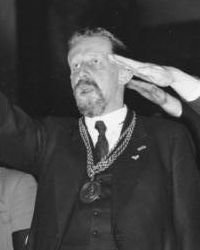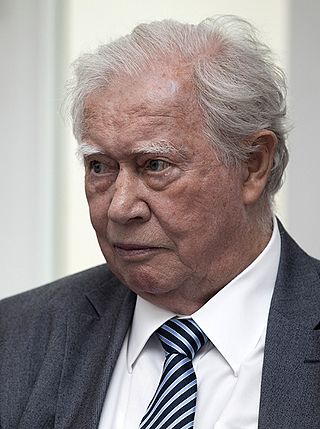Related Research Articles

The Nazi Party, officially the National Socialist German Workers' Party, was a far-right political party in Germany active between 1920 and 1945 that created and supported the ideology of Nazism. Its precursor, the German Workers' Party, existed from 1919 to 1920. The Nazi Party emerged from the extremist German nationalist, racist and populist Freikorps paramilitary culture, which fought against communist uprisings in post–World War I Germany. The party was created to draw workers away from communism and into völkisch nationalism. Initially, Nazi political strategy focused on anti–big business, anti-bourgeois, and anti-capitalist rhetoric; it was later downplayed to gain the support of business leaders. By the 1930s, the party's main focus shifted to antisemitic and anti-Marxist themes. The party had little popular support until the Great Depression, when worsening living standards and widespread unemployment drove Germans into political extremism.

The German Workers' Party was a short-lived far-right political party established in Weimar Germany after World War I. It only lasted from 5 January 1919 until 24 February 1920. The DAP was the precursor of the Nazi Party, which was officially known as the National Socialist German Workers' Party.

The Hitler Youth was the youth organisation of the Nazi Party in Germany. Its origins date back to 1922 and it received the name Hitler-Jugend, Bund deutscher Arbeiterjugend in July 1926. From 1936 until 1945, it was the sole official boys' youth organisation in Germany and it was partially a paramilitary organisation. It was composed of the Hitler Youth proper for male youths aged 14 to 18, and the German Youngsters in the Hitler Youth for younger boys aged 10 to 14.

Eugen Fischer was a German professor of medicine, anthropology, and eugenics, and a member of the Nazi Party. He served as director of the Kaiser Wilhelm Institute of Anthropology, Human Heredity, and Eugenics, and also served as rector of the Frederick William University of Berlin.

Alexander Harbord Mitscherlich was a German psychiatrist and psychoanalyst.

Sir Ian Kershaw is an English historian whose work has chiefly focused on the social history of 20th-century Germany. He is regarded by many as one of the world's foremost experts on Adolf Hitler and Nazi Germany, and is particularly noted for his biographies of Hitler.

Hans Mommsen was a German historian, known for his studies in German social history, for his functionalist interpretation of the Third Reich, and especially for arguing that Adolf Hitler was a weak dictator. Descended from Nobel Prize-winning historian Theodor Mommsen, he was a member of the Social Democratic Party of Germany.

David Israel Kertzer is an American anthropologist, historian, and academic, specializing in the political, demographic, and religious history of Italy. He is the Paul Dupee, Jr. University Professor of Social Science, Professor of Anthropology, and Professor of Italian Studies at Brown University. His book The Pope and Mussolini: The Secret History of Pius XI and the Rise of Fascism in Europe (2014) won the 2015 Pulitzer Prize for Biography or Autobiography. From July 1, 2006, to June 30, 2011, Kertzer served as Provost at Brown.
Werner Egk, born Werner Joseph Mayer, was a German composer.
Josef Pieper was a German Catholic philosopher and an important figure in the resurgence of interest in the thought of Thomas Aquinas in early-to-mid 20th-century philosophy. Among his most notable works are The Four Cardinal Virtues: Prudence, Justice, Fortitude, Temperance; Leisure, the Basis of Culture; and Guide to Thomas Aquinas.

Saul Friedländer is a Czech-born Jewish historian and a professor emeritus of history at UCLA.

The Nazi regime in Germany actively promoted and censored forms of art between 1933 and 1945. Upon becoming dictator in 1933, Adolf Hitler gave his personal artistic preference the force of law to a degree rarely known before. In the case of Germany, the model was to be classical Greek and Roman art, seen by Hitler as an art whose exterior form embodied an inner racial ideal. It was, furthermore, to be comprehensible to the average man. This art was to be both heroic and romantic. The Nazis viewed the culture of the Weimar period with disgust. Their response stemmed partly from conservative aesthetics and partly from their determination to use culture as propaganda.

Jutta Rüdiger was a German psychologist and head of the Nazi Party's female youth organisation, the League of German Girls, from 1937 to 1945.

Heinz Peter Longerich is a German professor of history and historian. He is regarded by Ian Kershaw, Richard Evans, Timothy Snyder, Mark Roseman and Richard Overy, as one of the leading German authorities on the Holocaust.

Martin Kitchen is a British-Canadian historian, who has specialized in modern European history, with an emphasis on Germany. He is internationally regarded as a key author for the study of contemporary history.

Heinz Lord was a German-American surgeon. A survivor of the Nazi concentration camps, Lord was elected Secretary-General of the World Medical Association shortly before his death in 1961.
Hans Severus Ziegler was a German publicist, theater manager, teacher and Nazi Party official. A leading cultural director under the Nazis, he was closely associated with the censorship and cultural co-ordination of the Third Reich.

This is a list of books about Nazi Germany, the state that existed in Germany during the period from 1933 to 1945, when its government was controlled by Adolf Hitler and his National Socialist German Workers' Party. It also includes some important works on the development of Nazi imperial ideology, totalitarianism, German society during the era, the formation of anti-Semitic racial policies, the post-war ramifications of Nazism, along with various conceptual interpretations of the Third Reich.

Peter C. W. Hoffmann was a German-Canadian historian who was the William Kingsford Professor in the Department of History at McGill University. His principal area of research dealt with the German resistance against Nazism, and in particular, the resistance efforts of Claus von Stauffenberg. Hoffmann lived in Canada and in Germany.

Barnabás von Géczy was a Hungarian violinist, composer and bandleader.
References
- 1 2 3 4 5 6 "Inventory of the Michael H. Kater fonds". York University Libraries. April 9, 2003. Retrieved March 10, 2023.
- 1 2 3 "Michael Kater". The Canadian Centre for German and European Studies, York University. October 23, 2015. Retrieved March 10, 2023.
- ↑ "Past Award Winners". Royal Society of Canada . 21 October 2018. Retrieved March 10, 2023.
- ↑ Jonathan Petropoulos (March 5, 2020). "Book offers broadest and deepest study of Nazi culture yet". The Art Newspaper. Retrieved March 10, 2023.